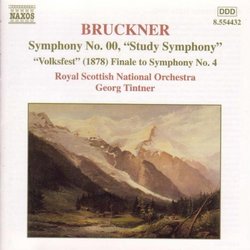| All Artists: Anton Bruckner, Georg Tintner, Royal Scottish National Orchestra Title: Bruckner: Symphony No. 00 'Study Symphony' / 'Volkfest' (1878) Finale to Symphony No. 4 Members Wishing: 0 Total Copies: 0 Label: Naxos Original Release Date: 1/1/2000 Re-Release Date: 4/11/2000 Genre: Classical Style: Symphonies Number of Discs: 1 SwapaCD Credits: 1 UPC: 636943443224 |
Search - Anton Bruckner, Georg Tintner, Royal Scottish National Orchestra :: Bruckner: Symphony No. 00 'Study Symphony' / 'Volkfest' (1878) Finale to Symphony No. 4
CD Details |
CD ReviewsFascinating, early Bruckner Bengt Gallmo | VISBY Sweden | 09/08/2000 (5 out of 5 stars) "Get this CD! You are unlikely to find a public performance of Bruckner's "00", and there are not many recordings either. It is lovely music, and very interesting if you know the later Bruckner symphonies. That Tintner, Royal Scottish National Orchestra, and Naxos, can produce a good recording goes without saying.Symphony "00" is an exercise during Bruckner's studies. It is clearly not mature Bruckner. Tintner, in the acompanying booklet, compares it to Schumann and Mendelsohn. As a Scandinavian, I am even reminded of Grieg sometimes (his symphony, also an early work, is contemporary with Bruckners "00"), but he was also influenced by Mendelsohn, so Tintner is, of course, right. Then, in the middle of it all, you can hear the coming Bruckner (ending of first movement, scherzo). The juxtaposition of Mendelsohn and Bruckner, and the glimpse of Bruckner's development as a composer, is fascinating! It seems that he went through both a Mendelsohn period and a Wagner period, with more and more of himself, before he became the "real" Bruckner - nobody else could have written his 9th!" A Hidden Gem Allan R. MacLeod | 06/06/2000 (5 out of 5 stars) "Once again Georg Tintner has made a convincing case for a neglected Bruckner work. Earlier, it was the original version of the third. This time it is Bruckner's first symphony--the study symphony. Other versions never ask to be listened to a second time, but this one does. It is unusual for Bruckner in that it is early Romantic in style--Schubert or Schumann, although the scherzo sounds like the Bruckner we know. Tintner brings out its lyricism (with a little cheating, he admits). It certainly ranks with the symphonies of Schumann. Once again, the RSNO is superb and the sound is excellent. But do not listen to the "filler" too soon after listening to the symphony. This second version of the last movement of the fourth was quite properly rejected by Bruckner. Although as usual the performance is excellent, it just isn't good Bruckner. But it is the Bruckner we know as opposed to this romantic lyricist of the symphony and the contrast between the two works is so extreme that you almost find yourself wishing Bruckner had not become Bruckner. But the CD is a splendid addition to what has been a spendid series." Bruckner finding his voice Richard A. Cavalla | NJ, USA | 05/20/2000 (4 out of 5 stars) "This symphony, Bruckner's first attempt at the form, hints at the masterpieces to come. However, it belies its influences very easily. While it still has moments that show Bruckner's unique voice, I hear a lot of Beethoven, Schubert, and Schumann in this symphony. The excellent scherzo is probably the portion of the symphony that stands out as being the most "Brucknerian"; Bruckner always wrote great scherzos and this is no exception. Tintner gives a sensitive and devoted performance that is up to the high standards of this series. The Symphony 00 is definitely worth the investment for Bruckner or Tintner fans, but it obviously is not on the same level as Bruckner's mature symphonies.
The filler is the 20 minute "Volksfest" finale to Bruckner's Symphony No. 4. It is the second of three different finales Bruckner wrote for this popular symphony. It is structured differently from the final version, but you will recognize a lot of the same melodies. I was very impressed by Tintner's performance; I think I will program the first 3 movements of Tintner's full Symphony No. 4 but substitute this "Volksfest" finale from time to time as a change of pace." |


 Track Listings (5) - Disc #1
Track Listings (5) - Disc #1